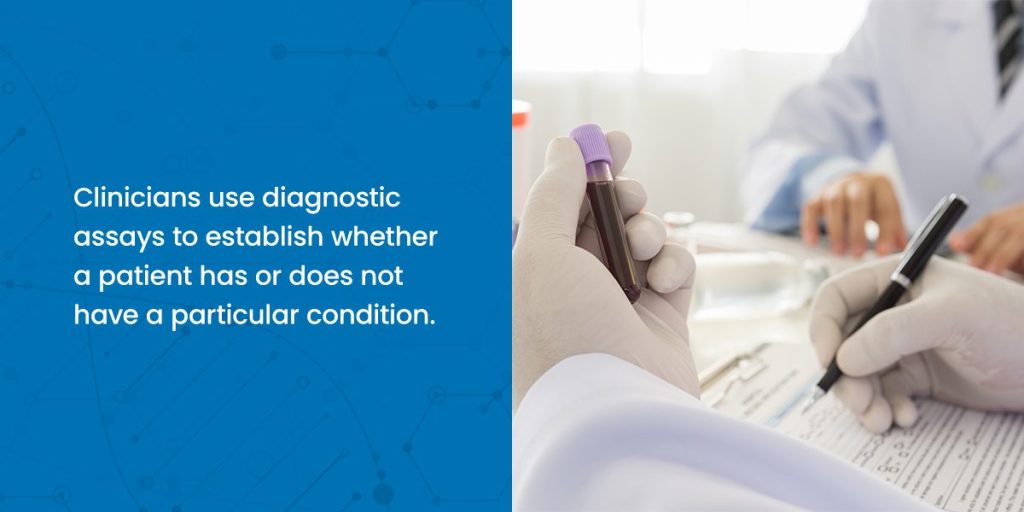Table of Contents
- What Is a Diagnostic Assay?
- Types of Molecular Diagnostic Assays
- What Are Molecular Diagnostic Assay Kits Used For?
- The Importance of Diagnostic Assays
As a physician or clinical laboratory professional, you know how important it is to streamline patient care and offer a wider range of testing for your patients. In 2018 — two years before the coronavirus pandemic began — the CDC stated that over 14 billion lab tests are ordered every year. These test results influence 70% of medical decisions.
Medical testing products are critical for effectively diagnosing and treating diseases. However, offering specific pathogen tests to your patients can be challenging if you lack access to the right diagnostic equipment or tests.
Often, healthcare professionals are faced with several possible causes for a given set of symptoms — this leads to the challenge of efficient and accurate testing. Healthcare providers need to order tests that align with their suspected cause(s) and offer reliable results. The right diagnostic assays or kits should make this possible.
If your current tests can’t differentiate between specific causes, that can delay diagnoses, leave patients frustrated and impact your bottom line. Clinical diagnostic assays can identify specific biological markers or pathogens for diagnosis and aid in developing new drugs and vaccines, making them a vital part of any laboratory.
Learn More About Diagnostic Assays
What Is a Diagnostic Assay?
Diagnostic assays are used to analyze specific biological markers for diagnosis or monitoring of risk factors. Hospitals and labs use diagnostic assays to determine whether a clinical sample contains a target analyte (s). Assay kits can measure the presence, quantity, intensive property, or functional activity of the assay target or entity, which can be any of the following:
- Drug
- Compound
- Chemical element
- Organic sample
- Cell in an organism
- Microbial Pathogen
Diagnostic tests enable healthcare professionals to diagnose diseases and monitor risk factors. With a clear understanding of the biological targets at work, providers can develop effective treatments for individual patients.
Diagnostic assays are defined by a set of reagents — a substance or mixture added to a system to cause a chemical reaction — which produces detectable signals for assessing a biological process. Reagents reveal the presence and validity of a target and offer clinicians a close-up view of the sample’s biological profile. Assay quality depends on the signal’s robustness and reproducibility and the type of signal the assay is measuring. Some examples of signal-type measures are:
- Absorbance
- Fluorescence
- Luminescence
- Radioactivity
These measurements can give laboratorians and clinicians valuable information about the specimen they’re testing.
Types of Molecular Diagnostic Assays
When clinicians want to identify targets in a given sample to aid diagnosis, they rely on molecular diagnostic assays — a type of clinical diagnostic assay.
Under the umbrella of molecular diagnostic assays, clinicians can use syndromic panels or multiplex diagnostic tests. These panels combine tests for various pathogens into a single test. In syndromic panels, all targets may cause similar general symptoms. Syndromic is the process of using a single test to simultaneously target multiple pathogens with overlapping signs and symptoms. Prior to the commercial availability of these tests, clinicians often had to test for each potential pathogen individually to diagnose a patient, leading to delay in diagnosis, inefficient workflow and high costs for healthcare facilities. In an effort to save time or cost, clinicians may have felt limited to the number of tests they could order. Syndromic panels and multiplex Dx tests combine these tests into a single panel for faster results with greater cost-effectiveness.

What Are Molecular Diagnostic Assay Kits Used For?
Clinicians use diagnostic assays to establish whether a patient has or does not have a particular condition. Molecular diagnostics encompass diverse fields such as:
- Infectious diseases
- Pharmacogenomics
- Genetics
- Oncology
Molecular diagnostic assays have become exceedingly valuable to the infectious disease field. In these cases, preventing the spread of illness is essential for protecting public health. Fast and accurate results about given targets inform care for individual patients so they can feel better, sooner.
The developments in molecular diagnostic assays are still expanding, but clinicians can currently rely on them for understanding bloodstream, respiratory, gastrointestinal, and CNS infections. With pathogens like coronavirus sharing similar symptoms to other respiratory targets like influenza, these diagnostic panels offer greater clarity in results and simplified workflow for clinical labs.
The Importance of Diagnostic Assays
A 2021 public health study highlighted the importance of efficient and accurate clinical diagnostic assays being widely available in light of the COVID-19 pandemic. Molecular diagnostic assays make up a large portion of the tests that clinicians use to identify and diagnose COVID-19 and help control the spread of infection. This has changed with more widely available rapid antigen tests.
This research highlighted diagnostic assays’ critical role in identifying and differentiating certain coronavirus strains. Diagnostic assays have the highest sensitivity and can target multiple genes simultaneously, which was vital to clinical laboratories overwhelmed with cases.
As this study showed, molecular diagnostic assays were essential in containing the pandemic, particularly in laboratories or regions with limited resources. Finally, the study suggested the further development of such assays can help the scientific community address a wide range of human diseases in the future.

Transform Your Laboratory Experience With Applied BioCode Inc.
If you work in the medical or pharmaceutical industry, your laboratory likely uses many different types of equipment and testing methods to keep patient care updated, streamlined, and efficient. At Applied BioCode Inc., it’s our mission to help clinical laboratories detect more targets, reduce the number of instruments needed to scale, and mask and unmask pathogen targets more effectively.
We are an in vitro diagnostic company that designs and develops various testing products, including clinical diagnostic assays with barcoded magnetic beads, to identify and diagnose pathogens more accurately. Our products include:
- BioCode® Gastrointestinal Pathogen Panel
- BioCode® Respiratory Pathogen Panel
- BioCode® SARS-CoV-2 Assay
- BioCode® CoV-2 Flu Plus Assay
Optimize how your laboratory uses tools for research and diagnosis and streamline patient care as a result. Contact us today to learn more about our active pipeline of future products.


